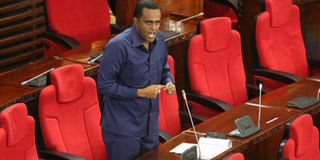ETHICS :Bashe’s public sincerity in House

Nzega MP Hussein Bashe
What you need to know:
- It is equally unsettling to have leaders who have been given mandate with authority as well as national duties as guardians of the moral order and yet they are hypocrites. It is agitating and totally unacceptable.
It is a very dangerous behaviour. Hypocrisy and duplicity, like cancer, are both real and life threatening, both talked about more than actually understood. How can someone holding a high office, a public servant, a representative of the people, hold a belief while acting in discord with it?
It is equally unsettling to have leaders who have been given mandate with authority as well as national duties as guardians of the moral order and yet they are hypocrites. It is agitating and totally unacceptable.
These are hypocrites. And hypocrisy is one of the moral questions of the highest order. These are the people who can easily open doors and usher in all sorts of cruel madness on this peaceful country. No one who loves this country should accept this behaviour. The more these people get accommodated they can easily create what I would call state hypocrisy, something even more dangerous.
This we say because hypocrisy has power potentially to undo democracy. The corrosive powers of hypocrisy can also make our leaders, leading institutions and citizens peculiarly vulnerable.
For honourable Hussein Bashe, when you live and work with people who publicly uphold strict moral norms, expecting and demanding others to follow them, but who privately violate these espoused standards in their own behaviour, you will be living in a very dangerous environment.
To be safe, you better voice out and tell them not to behave in a socially unacceptable manner. No one wants to live with endless worries about the way politicians use empty words to conceal what they are up to.
Yes, Honourable Bashe has recently distinguished himself, in the House, from a situation where individuals do not follow their own expressed moral rules and principles. He, like any other moral person, would not accept a situation where the powerful show a greater discrepancy between what they practice and what they preach.
It is equally disconcerting, for the stain of hypocrisy in the House could actively lead to other challenges including but not limited to failure to promote democracy as my fellow political scientist calls it – hypocrisy is a hidden foes of democracy; it weakens efforts to resolve the economic problems of the country; causes a serious waning of confidence in parties, politicians, Parliament, and other core institutions of representative democracy. But above all, if it is tolerated, hypocrisy could easily lead to citizens feeling worthless, embarrassed and humiliated.
So Honourable Bashe is right. Hypocrisy is a very dangerous human behaviour. And sadly we live in times marked by this terrible behaviour. Unfortunately, it is a growing old problem with deep roots characterised by a massive gap between promise and performance. This has become abysmal and so intolerable to people like Bashe.
Hypocrisy is providing the way, not only for a concerted and coherent attack on democracy, but is it already and tangibly failing its promotion.
It is coming in various shapes and sizes, at it has happened in the house. A moral advice is important here. Let our representatives not impose strict moral standards on others but on the other hand practice less strict moral behaviour themselves.
Since there is always a possibility of power increasing hypocrisy, let them not relieve themselves of responsibility. Let them not perpetuate social inequality due to their hypocrisy. We elected them, and they are our guardians of the moral order.
So in a real sense, even though Bashe is aware of the difficulty of trying to rescue politics from the most destructive forms of hypocrisy, yet he has been bold enough and clearly raised concerns on the moral dilemma of hypocrisy.
He has reminded fellow lawmakers to avoid the temptation of claiming to believe something but acting in a different manner. Surely, for Bashe, as it would be to other few ethical leaders, anyone who pretends to be what he is not, is an enemy to be avoided.
So the vice of hypocrisy is terrible.
Dr Alfred Sebahene is a lecturer at St. John’s University of Tanzania




